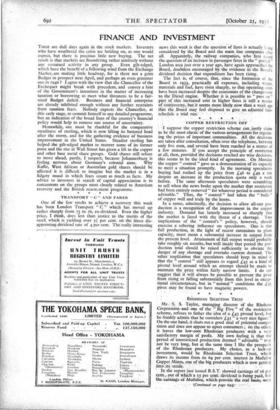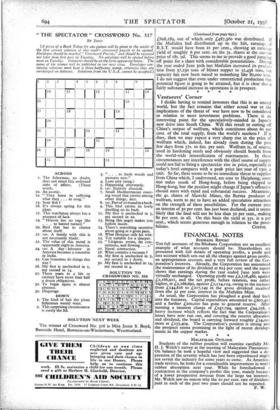FINANCE AND INVESTMENT
THESE are dull days again in the stock markets. Investors who have weathered the crisis are holding on, as one would expect, but there is precious little new buying. The net result is that markets are floundering rather aimlessly without any sustained activity in any group. Even gilt-edged, which have the benefit of a following wind from the Exchange Market, are making little headway, for is there not a grim Budget in prospect next April, and perhaps an even grimmer one in 1940 ? I agree with the view that the Chancellor of the Exchequer might break with precedent, and convey a hint of the Government's intentions in the matter of increasing taxation or borrowing to meet what threatens to be a fair- sized Budget deficit. - Business and financial enterprise are already inhibited enough without any further restraints from taxation fears. Nobody expects the Chancellor, at this early stage, to commit himself to any detailed programme, but an indication of the broad lines of the country's financial policy would help to remove one source of uncertainty.
Meanwhile, one must be thankful for the comparative steadiness of sterling, which -is now lifting its battered head after the storm, and for the gathering evidence: of business improvement in the United States. Steadier sterling has helped . the gilt-edged market to recover some of its former poise and the rise in Wall Street has given a lift to the copper and other base metal share groups. Gold shares still refuse to move ahead, partly, I 'suspect; because 'Johannesburg is feeling nervous about Germany's colonial aims. Why Kaffir, West. African or Australian gold shares should be affected it is difficult to imagine but the market is in a fidgety mood in which fears count as much as facts. My advice to investors in search of capital appreciation is to concentrate on the groups most closely related to American recovery and the British rearmament programme. * * * *
TRANSPORT " C " AND FARES
One of the few stocks to achieve a recovery this week has been London Transport " C " which has moved up rather sharply from 73 to 76, ex-dividend. Even the higher price, I think, does less than justice to the merits of the stock which is yielding over 51 per cent: on 'the latest dis- appointing dividend rate of 4 per cent. The really interesting news this week is that the question of fares is actually being considered by the Board and the main line companies after all. Apparently, the railway companies, livho first raised the question of in increase in passenger fares in the " pooled " London area just over a year ago, have again approached the Board, doubtless encouraged by-ille evidence in the Board's dividend decision that expenditure has been rising.
The fact is,- of course, that, since the formation of the Board in 1933, practically all expenses, including wages, materials and fuel, have risen sharply, so that operating costs have been increased despite the economies of the change-over to, the `Diesel engine. Whether it. is possible to." pass on " part'Of 'this increased- cost in 'higher "fates is-still a matter of controversy, bpi it seen* more:likelyJtow thaii a week ago that the Board may feel disp0sed to give an adjusted fare- schedule a trial- ran.' -" • - • - • - , z I suppose the copper restriction scheme .can,justly claim to be the most elastic of the various arrangements for regulat- ing the prices of important .commodities. All the decisions are taken after consultation, often'oVer the telephone, between only five men, and several have been reached in a matter of a few minutes. If you accept the principle of restriction at all, then, provided the decisions reached are wise decisions, this seems to be the ideal Icind of agreement.: On Monday the copper " control " gave us a demonstration of its capacity to meet a situation promptly. In the morning speculatiye buying had rushed up the price from £46 to £49 a ton despite an increase in the production quota only a week before. The same afternoon speCulators were scrambling to sell when the news broke upon- the market that restriction had been entirely removed " for whatever period is considered advisable." Thus, the " control " had taken the " bulls " of copper well and truly by the horns.
In a sense, admittedly, the decision to allow all-out pro- duction is a recognition of the improvement in the copper industry. Demand has latterly increased so sharply that the market is faced with the threat of a shortage. Two implications of the " control's " policy, however, should exercise a" sobering influence on speculators. One is that full production, in the light of recent extensions to plant capacity, must mean a substantial increase in output from the present level. Attainment of full output would probably take roughly six months, but well inside that period the pro- duction total should be raised sufficiently to obviate the danger of any shortage and overtake- current demand. The "other • implication that speculators should- keep in mind is that the control " still appears to regard. £45 as a kind of pivotal level around which an attempt should be made to maintain the price within fairly narrow limits. I do not suggest that it will always be possible to prevent the price 'from rising or falling substantially from this level in excep- tional circumstances, but in " normal " conditions the £45 pivot may be found to have magnetic powers.
* * * * RHODESIAN SELECTION TRUST Mr. S. S. 'Taylor, managing director of the Rhokana Corporation-and- one of the " Big Five " of the restriction scheme, refuses to father the idea of a £45 pivotal level, but he fraialdy admits that he considers £45 a very nice figure." On the one hind, it shuts out a good deal of potential compe- tition and does' not appear w upset consumers ' • the other, it leaves the low-cost • Rhodesian producers with a very satisfactory margin of profit. My own -feeling is that the period of unrestricted production deemed " advisable " may not be very long, but at the same time I hike the prospects of the Rhodesian producers. My choice, as a lock-up investment, would be Rhodesian Selection Trust, which draws its income from its 64 per cent. interest in Mufulira Copper Mines, one of the big producers which is now getting into its stride. - In the report just issued R.S.T. showed earnings of 16 per cent., out of w.hicb a L5 per cent. dividend is:being paid, but the. earnings-of Mundira, which- provide -the real basis; were - (Continued- on Page 694)-
. • . COPPER RESTRICTION OFF
(Continued from page 692.) £698,189, out of which_ only £487,360 was distributed. If the Mufulira had distributed up to the hilt, earnings of R.S.T. would have been 21 per cent., showing an earnings yield of roughly 6 per cent. on the 55.. shares at the current price of as. 9d. This seems to me to provide a good jumping off point for a share with considerable potentialities. During the year ended June 3oth last Mufulira increased its produc- tion from 37,230 tons of blister copper to 52,436 tons, but capacity has now been raised to something like 8o,000 tons. I do not suggest that even under unrestricted production this potential figure is going to be attained, but it is clear that a fairly substantial increase in operations is in prospect. * * * * Venturers' Corner I dislike having to remind investors that this is an uneasy world,- but the fact remains that either actual war or the implications of the threat of war have now to be considered in relation to most investment problems. There is an interesting point for the speculatively-minded in Japan's new drive into South China. Will this result in cutting off China's output of wolfram, which constitutes about 6o per cent. of the total supply, from the world's markets ? If it does, then we may expect a very sharp rise in the price of wolfram which, indeed, has already risen during the past few days from 57s. to 62s. per unit. Wolfram is, of course, used in hardening steels and obviously should benefit from the world-wide intensification of rearmament. In these circumstances any interference with the chief sourse of supply could not fail to bring a spectacular rise in price, especially as today's level compares with a peak price last year of 13os. a unit. So far, there seems to be no immediate threat to supplies from China which, I understand, are sent to Haiphong, some 600 miles south of Hong-kong, before being shipped to Hong-kong, but the position might change if Japan's offensive should meet with rapid and substantial success. Meantime, the 4s. shares of Mawchi Mines, the Buirna producer of wolfram, seem to me to have an added speculative attraction on the strength of these possibilities. For the current year an interim of 3o per cent. has just been declared, and it seems likely that the final will not be less than so per cent, making 8o per cent. in all. On this basis the yield at 35s. is 9 per cent., which seems generous enough in relation to the possi-
















































 Previous page
Previous page